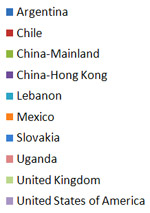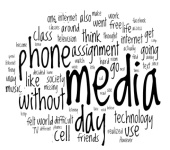
Bar chart (above) of isolation expressed by students attending universities in participating countries. The numbers represent relative weights for each country. Click on chart to go to full graphic comparing all emotions.
HIGHLIGHTS
- Disconnected from media = Loneliness: When students unplugged from media they also unplugged from their friends. Immediately they complained about how isolated and alone they felt. “All I wanted to do was pick up my phone and become a part of the human race again,” said a U.K.-based student.
(Click for further details.)
- Recognition that media had been an anodyne for social isolation: For some students, going without media for 24 hours was like ripping back the curtain on their hidden loneliness. ‘Virtual’ connections had been substituting for real ones, and often not entirely consciously. Said one Slovakia-based student: “We don’t know to talk, to share our feelings with others in other ways than on Facebook or through a phone.”
(Click for further details.)
- Cutting the digital connection meant experiencing time differently: For students who weren’t paralyzed by boredom, the 24-hours without media became a day in which time unfolded differently – perhaps more generously. And top of the list of differences was how students related to their close friends and family. Many wrote about being more “present” because they weren’t multitasking with a hand-held phone or watching TV in the background. Conversations became richer, deeper, more meaningful.
(Click for further details.)
“When I was alone I felt disconnected and even when I was with people I felt disconnected – all because I couldn’t use media.” — USA
Is anybody there?: Many students experienced feelings of loneliness and isolation. They were not able to contact people who lived close by or those who lived faraway. Students also vociferously complained of not being able to engage in media-related activities with friends, such as watching TV in the dorm or listening to music in the car.
- China: “At the beginning, I felt irritable, tense, restless and anxious when I could not use my mobile phone. When I couldn’t communicate with my friends, I felt so lonely as if I was in a small cage on an island.”
- Hong Kong: “I felt very stressed, bored and like I’m isolated from the society and my friends. I kept imagining what they are doing and writing in Facebook, and wondering what they are chatting on MSN. I had a strong urge to connect with them.”
- Mexico: “Actually I am a slave of my Blackberry. This is a feeling of being completely disconnected from the world and those one who are close to you.”
- Argentina: “I believe that I have no will power to be disconnected – and it is also impossible because I have to talk to my family and I like to be informed about what to talk about.”
- Uganda: “The 24 hours I spent without using any media created a gap in my life. I missed communicating with my friends through daily social networks and they also felt like there was a problem with me.”
- USA: “I depend so heavily on my phone to relieve any sort of social anxiety.”
- Slovakia: “The majority of day I spent sleeping, doing household chores and helping my mum in kitchen. I cooked and prepared a delicious salad. My mum was proud of me. But I still felt isolated, without information and limited to the people around me.”
- UK: “Without being able to access the internet, read a newspaper or listen to the radio I felt completely cut-off from the world. I was edgy and irritated for most of the day and couldn’t even listen to my music to calm me down. I tried to preoccupy myself with written work and a trip into town – but all I wanted to do was pick up my phone and become a part of the human race again.”
- USA: “I found it to be kind of lonely due to the fact that no one was willing to be with me for a long period of time. At one point I asked a friend on my floor to help me with my cat puzzle and he said, “Oh, no thanks. I have a life.”
Painful loneliness: Perhaps most disturbing, however, was that many students came to recognize the extent of their isolation even during the days when they were able to use media. For many, their ‘virtual’ relationships with media had been substituting for real connections to others.
“I don’t feel like I’m just sitting alone in my room if I’m watching TV.” — UK
- Slovakia: ““We live too quickly and we just don’t have time to wait for someone. We call them or chat with them when we need them – that is the way we have gotten used to relationships.”
- Chile: “I felt lonely without multimedia. I arrived at the conclusion that media is a great companion.“
- China: ““Normally, I like to watch movies and TV in the bedroom, and [I feel] a temporary release and relief from pressures. Instead of communicating with other people, I have always indulged in my own media world.”
- Hong Kong: “Once you enter the internet life, you can do whatever you want to: play games/chat with friends/receive information/news. To a certain extent I agree that this is actually our second life. One can even sit, motionless, and spend the whole day interacting with the computer. You can skip your meals, skip the sleeping time and you can even give up your real life identity to get indulged in the Internet world.“
- Lebanon: “I felt as though I was ‘lost’ in a void. It was a very unusual and uneasy feeling. I felt like I was dis-attached from the world completely, as if everyone around me was doing something but I was ‘left behind’.”
- Slovakia: “Maybe it is strange and not healthy that I can’t be without knowing what people say, how they feel, where they were, what happened.”
Good to see your face: The ‘digital’ isolation that most students felt prompted some to actively seek out friends and family. Without being able to rely on media to communicate, they had to make an effort to see people in person. Yet because the students couldn’t fall back on familiar plans such as going to the movies, they reported that they convinced friends to take walks or to go out to eat.
Students observed that when they went unplugged they used time differently: not every second was filled with texting or updating their Facebook status. A few students thoughtfully noted the luxury of having uninterrupted ‘time’ to be with friends, and came to recognize the value of rambling conversations.
- Chile: “So I used the free day not to seek the stressful media packed everyday life and went with a friend outside of Santiago to a natural reserve, where we spent the day hiking, talking and enjoying the wonderful nature on a sunny day.“
- Hong Kong: “I could not work or have entertainment for 24 hours without a computer, thus the only choice for me was to see friends’ company. After lunch, we wandered and chatted on the street. The direction was not important. We had a lot of things to share but have always had little time. Hong Kong is a busy city. Time is a luxury here. But on that day, we did not think about time. Since I could do nothing besides chatting with my classmate, time was really meaningless.”
- UK: “I didn’t really mind that I was missing out on the news. In fact, the feeling of not knowing what was happening was liberating – suddenly the conversations and discussions I had with other people seemed far more important.”
“I visited my grandparents. They were surprised, but really pleased. Instead of watching TV with my boyfriend we went for a walk and we liked it.” — Slovakia
Quotes may have been edited to regularize spelling and grammar.







